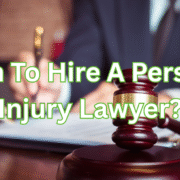Can A Personal Injury Lawyer Drop Your Case?
Yes. A personal injury attorney can withdraw if the evidence is weak, you mislead them, or conflicts arise. Utah ethics let lawyers step away when the partnership no longer helps your case or risks breaking legal duties. They must give notice.
Hiring an accident attorney feels like handing your worries to a helper who knows the courtroom. Still, there are moments when that helper decides to walk away. It can happen weeks or even months into a claim.
Whether you were hurt in a car crash, slipped on ice outside a Provo store, or lost wages after a workplace fall, the sudden exit of counsel raises new stress. This blog explains why it happens, how to react, and how to find legal help you can count on in Utah.
Whether you are a parent, teen, or grandparent, the explanations are clear and straightforward. So, you can follow along without thumbing through a law dictionary.
Key Points You Should Know
- Lawyers must comply with the Utah Rules of Professional Conduct
- Weak evidence pushes many firms to withdraw early
- Missed medical visits shrink case value sharply
- Dishonesty can force an attorney to quit fast
- Conflicts of interest end the attorney-client tie
- Filing deadline pressure may scare firms away
- Firm resources matter in catastrophic injury claims
- Good communication often prevents sudden withdrawal
10 Reasons Why a Personal Injury Attorney Might Drop Your Case
If you were sitting across from your injury compensation lawyer, ready to talk settlement, and they said they must pull out, then how would you feel? It feels personal, yet most withdrawals come from professional duties, not mood swings.
Below are ten common reasons Utah personal injury lawyers let a file go. Being familiar with them helps you prevent missteps and keep your case on track.
1: Critical Evidence Went Missing
Your lawyer needs medical charts, crash reports, and photos to show fault and harm. Lost X-rays, deleted dash-cam footage, or a missing product piece leave holes no civil litigation lawyer can patch.
Without proof, insurers push back hard, and the attorney risks wasting billable hours. If key items vanish despite good-faith effort, your counsel may file a motion to withdraw to honor court rules against frivolous claims. Protect yourself by gathering and backing up every record on the day an accident happens.
2: Client Dishonesty
Personal injury attorneys speak for you. If you lie, they repeat that lie in court filings, risking sanctions. Once a bodily injury attorney spots false wage statements or finds out you hid an earlier back injury, they must choose: report the issue, persuade you to correct it, or step aside. Withdrawal keeps the lawyer’s license safe and shields the firm from penalties. Keep full honesty from day one, even if the truth feels embarrassing.
3: Conflict of Interest
Ethics rules forbid a tort law attorney from representing two sides with clashing interests. Suppose the firm already represents the delivery driver who hit you, or the lawyer’s spouse works for the insurer. The conflict blocks loyal service. Firms run checks before intake, yet clashes sometimes appear later, maybe a witness becomes a client in another matter. The attorney then files a notice, giving you time to find new counsel without hurting pending deadlines.
4: Potential Damages Are Too Low
A contingency fee personal injury lawyer fronts costs such as expert reports, police transcripts, and court filing fees. When likely recovery falls below expenses, the math fails. Common triggers include:
- Medical bills under $2,000 with quick recovery
- Clear proof you shared most of the fault
- No lost wages or ongoing care costs
These facts shrink settlement value. Utah firms balance community service with staying open; if profit odds fade, they may withdraw and suggest small-claims court or self-representation instead.
5: Statute of Limitations Nearing
Utah gives most victims four years to sue, two in wrongful death, and shorter bars for some government claims. If you sign with an injury claim specialist close to the deadline, they may fear filing a rushed complaint lacking vital facts.
Filing late means dismissal and possible malpractice exposure. Rather than gamble, the lawyer can withdraw promptly, urging you to seek other help or file a pro se to stop the clock.
6: Ignoring Medical Advice
Medical care forms the backbone of damages. Skipping follow-up visits or rehab sessions leaves gaps that defense experts spotlight. Patterns that alarm a medical malpractice lawyer include:
- Missing therapy for more than one month
- Failing to fill prescriptions
- Returning to heavy work against the doctor’s orders
This conduct suggests you healed or caused new harm, slicing value and credibility. Your personal injury lawyer must protect the case’s integrity and may decide to drop representation if noncompliance keeps up despite repeated warnings.
7: Changing Your Story
Insurance adjusters record every statement. When your version of how the crash occurred shifts, credibility nose-dives. A trial advocacy lawyer can cross-examine hostile witnesses, but rescuing a shaky client’s story is far tougher.
If inconsistencies grow (perhaps you first claimed whiplash, then said no neck pain), the personal injury law firm may withdraw before spending more on a claim unlikely to win before a jury. Stick with the facts exactly as they happened.
8: Refusing a Fair Settlement
Lawyers advise; clients choose. Yet refusing an offer well within the expected verdict range can strain the partnership. Consider these checkpoints:
- Offer equals or exceeds projected jury award
- Future medical bills are fully covered
- Attorney explains risks of trying the case
If you still insist on a trial, a no-win-no-fee lawyer might end the tie rather than bankroll costly experts for a gamble. Openly weigh pros and cons with your counsel before rejecting money on the table.
9: Abusive Behavior Toward Firm Staff
Respect is a two-way street. Whether it’s verbal threats, a further barrage of late-night calls, or an attack on social media, morale is slammed, and the firm is open to claims of harassment. Utah ethics permit lawyers to withdraw to protect workers. Don’t forget: The receptionist and paralegal are part of your legal team; being nice to them helps keep your whole team winning.
10: Firm Resource Limits
Some catastrophic injury attorney teams run lean. A sudden influx of multi-vehicle crashes or a partner’s health crisis can sap time and funds. Rather than give half effort, the firm may withdraw, pointing you to a larger personal injury law firm with extra staff, in-house investigators, and cash reserves for pricey experts. Switching firms early often saves months.
A withdrawal notice is rarely a judgment on you as a person. It signals practical or ethical limits. With these ten triggers in mind, you can ensure your case is attractive to counsel and keep the road to fair recovery clear.
What Should I Do When My Injury Lawyer Drops My Case?
Sudden withdrawal stings, yet you still control the finish line. Utah law lets you move files quickly and preserve rights. Act fast and stay organized.
- Ask for a detailed reason in writing
- Request your full file plus evidence copies
- Confirm upcoming court or filing deadlines
- Contact the Utah State Bar referral service
- Meet at least two replacement accident attorneys
- Notify insurers about the representation change
- Keep medical treatments and therapy on schedule
- Avoid social-media posts about the dispute
- Track all case expenses for the new lawyer
Staying calm and proactive protects your claim’s value and shows future counsel you are a serious client worth fighting for. Finish each step within one week, if possible, to head off missed deadlines.
Hire a Personal Injury Lawyer You Can Trust
Skill matters, but trust moves mountains. Look for clear answers, prompt calls, and a plan you understand. When you sit down with a Personal Injury Lawyer at Cockayne Law, you meet folks who grew up or settled right here in Utah. They know Salt Lake juries, Ogden judges, and the way winter roads turn slick overnight.
Whether your problem requires a car accident lawyer, slip and fall lawyer, or wrongful death attorney, the firm lays out costs, timeframes, and likely outcomes in straightforward language. If your injury prevents you from coming to our office, a contingency fee personal injury attorney from the office will come to your home or hospital room.
From the early negotiations with insurance companies to aggressive trial work, Cockayne Law offers a solid civil-court competence minus the big-city attitude. You get to be the one calling the shots while their lawyers do the heavy lifting until the check clears.
Conclusion
A lawyer’s withdrawal feels like a storm just when you need shelter. Yet most exits tie back to fixable issues: missing proof, poor communication, or deadline stress. Stay honest, follow medical advice, and keep files tidy.
If things still fall apart, act swiftly to find new counsel. Utah’s legal field includes many certified professionals ready to step in. The key is open talk, timely records, and mutual respect. Your path to fair compensation remains open as long as you keep moving forward and choose helpers who believe in both your story and the hard work required to prove it.
FAQs
Why would a lawyer drop a personal injury case?
Most often due to weak evidence, conflicts of interest, client dishonesty, or low potential damages that make the case unsustainable on a contingency fee.
Can a lawyer drop your case without telling you?
No. Utah Rules of Professional Conduct require written notice to both you and the court. The judge must approve withdrawal once litigation has begun.
What is it called when a lawyer drops your case?
It is called withdrawal of representation. The attorney files a motion or notice of withdrawal with the court if a lawsuit is pending.
What happens if your lawyer loses your case?
On a contingency fee, you typically owe no legal fee, though you may still owe agreed-upon case costs such as medical record fees.
Does it look bad if your lawyer withdraws from your case?
It can raise insurer skepticism, but providing new counsel with full records and clear reasons helps restore credibility.
How does a lawyer get charges dropped?
In criminal matters, counsel may show a lack of probable cause or constitutional violations. This blog focuses on civil injury cases, not criminal defense.
Do lawyers get paid for cases they lose?
Contingency fee lawyers receive no fee if they lose, though clients may owe certain costs outlined in the fee agreement.

















